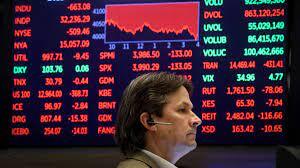US economy would recover during 2022, according to analysts 0:53
(CNN Business) --
The US economy is very weird right now.
Almost everyone who wants a job can have one.
The economy is so hot that prices are rising faster than at any time since the 1980s. The real estate market is booming.
Consumers spend like crazy.
Yet we keep hearing the word "recession" as if it were back in 2007. What's going on?
The truth is that we are probably not in a recession right now (although it is possible), but there are many signs that one is just around the corner.
Signal 1. The Fed raises interest rates
Inflation has been rampant and the way the Federal Reserve fights rising prices is through its ability to raise interest rates.
This makes borrowing more expensive and slows down the economy on purpose.
advertising
The problem is that the Federal Reserve has raised rates too late.
Inflation was a growing concern throughout 2021, but the central bank didn't start raising rates until March 2022. So the Fed has to catch up and take much more drastic action than if it had started raising rates. last year.
Last week, the Fed raised rates by half a percentage point, the biggest rate hike in 22 years.
Fed Chairman Jerome Powell said this month that the central bank would continue to raise rates by half a percentage point at the end of each meeting until it is satisfied that inflation is being brought under control, and then the Fed will continue to raise rates by a quarter point for a while.
The Fed is convinced that it can raise interest rates without plunging the economy into recession.
But that so-called "soft landing" has proved elusive in the past, and many Wall Street banks believe the Fed will engineer a recession to outpace inflation.
Signal 2. The stock market is in sell-all mode
Extreme fear is the prevailing sentiment on Wall Street this year.
The CNN Business Fear & Greed index stands at a measly 6 out of 100.
After hitting all-time highs in early January, the stock market has lost almost a fifth of its value, pushing stocks closer to bear market territory.
The Nasdaq is already in a bear market.
More than $7 trillion has evaporated from the stock market this year.
Worried that rising interest rates could erode company profits, investors have turned to exits.
That's bad news for people's retirement plans.
It's also unwelcome news for a number of investors who depend on the market for income, including day traders who have counted on the stock market growing in virtually a straight line for most of the decade.
And it's not good for consumer sentiment, either.
Although a minority of Americans actively invest in the stock market, when they see a sea of red next to the CNN stock ticker or on their phone screens, that has historically been sobering.
Consumer sentiment fell in May to its lowest level in 11 years.
This is bad news for the economy, as consumer spending accounts for more than two-thirds of US gross domestic product.
Signal 3. The bond market
When investors are not so enthusiastic about stocks, they tend to switch to bonds.
Not this time.
US Treasury bonds, which are safe, are being sold.
When bond prices fall, yields rise — with 10-year Treasury yields topping 3% this month for the first time since 2018.
That usually happens when the Fed raises rates: the higher cost of borrowing makes the bonds less valuable when they come due, so a higher interest payment on the bonds (the yield) will help offset and make them more attractive to investors. investors.
Bonds have also been sold because the Federal Reserve has decided to dump its huge portfolio of Treasuries that it had been buying since the pandemic to support the economy.
As bonds have sold off and investors have become more fearful of an economic downturn, the gap between short and long-term bond yields has been narrowing.
Two-year Treasury yields briefly rose above those of the benchmark 10-year bond in March for the first time since September 2019. That so-called yield curve inversion has preceded every recession since 1955, producing a "false positive" only once, according to the Federal Reserve Bank of San Francisco.
Sign 4. Chaos around the world
None of this happens in a vacuum.
Russia continues its deadly invasion of Ukraine, which has stifled supply chains and sent energy prices through the roof.
China continues to lock down some of its biggest cities as Covid-19 cases remain high.
And labor shortages have pushed up wages and hampered the normal flow of goods around the world.
Russia continues to threaten European countries with cutting off their energy shipments, which could plunge the EU economies into recession.
China's economy has slowed dramatically by keeping workers at home as part of its zero covid policy.
What happens abroad could also reverberate in the United States, hurting its economy at the worst time.
To do
Granted, the recession could be here soon.
This is what not to do: panic.
Although the recession is inevitable, it is not known how serious it will be.
But it never hurts to plan for the worst.
Financial advisors claim that you can insulate your finances from a recession.
Get a New Job Now
: With ultra-low unemployment and plenty of job openings, it's a market for job seekers.
This could change quickly in the event of a recession.
Take advantage of the housing boom
: If you are hesitant to sell your home, now may be the time to do so.
US house prices are up nearly 20% year-over-year, but mortgage rates are also rising, which will eventually dampen demand.
Set aside some cash
: It's always a good idea to have liquid assets—cash, money market funds, etc.—to cover urgent needs or unexpected emergencies.
Finally, a piece of sage advice for any market: don't get carried away by your emotions.
"Stay invested, be disciplined," says certified financial planner Mari Adam.
"History shows that what people—or even experts—think about the market is often wrong. The best way to reach your long-term goals is to simply stay in the investment and stick to your allocation."
Allison Morrow and Jeanne Sahadi of CNN Business contributed to this report.
Economy United States








/cloudfront-eu-central-1.images.arcpublishing.com/prisa/X33WQ3GSYFF3DBKJDAVIGHN3DA.jpg)






